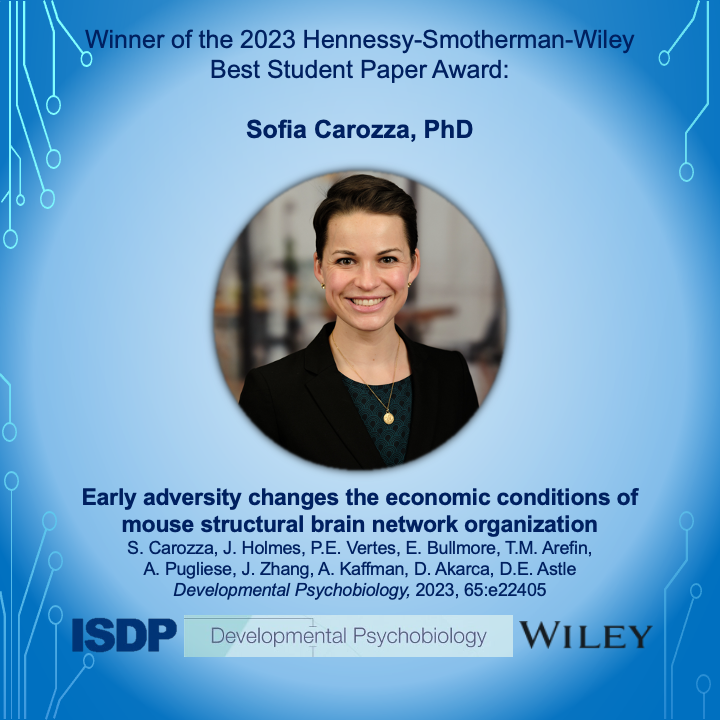
Early adversity changes the economic conditions of mouse structural brain network organization
S. Carozza, J. Holmes, P.E. Vertes, E. Bullmore, T.M. Arefin,
A. Pugliese, J. Zhang, A. Kaffman, D. Akarca, D.E. Astle
Developmental Psychobiology, 2023, 65:e22405
MRC Cognition and Brain Sciences Unit, University of Cambridge
Cambridge, United Kingdom @mrccbu
Sofia’s supervisor’s Twitter is: @DuncanAstle
Sofia Carozza is now a Postdoc at Harvard in Boston, USA,
Abstract:
Early adversity can change educational, cognitive, and mental health outcomes. However, the neural processes through which early adversity exerts these effects remain largely unknown. We used generative network modeling of the mouse connectome to test whether unpredictable postnatal stress shifts the constraints that govern the organization of the structural connectome. A model that trades off the wiring cost of long-distance connections with topological homophily (i.e., links between regions with shared neighbors) generated simulations that successfully replicate the rodent connectome. The imposition of early life adversity shifted the best-performing parameter combinations toward zero, heightening the stochastic nature of the generative process. Put simply, unpredictable postnatal stress changes the economic constraints that reproduce rodent connectome organization, introducing greater randomness into the development of the simulations. While this change may constrain the development of cognitive abilities, it could also reflect an adaptive mechanism that facilitates effective responses to future challenges.
- 2022 Hennessy-Smotherman Wiley Best Student Paper Award
- 2021 Hennessy-Smotherman Wiley Best Student Paper Award
- 2020 Hennessy-Smotherman Wiley Best Student Paper Award
- 2019 Hennessy-Smotherman Wiley Best Student Paper Award
- 2018 Hennessy-Smotherman Wiley Best Student Paper Award
Rules of Wiley Best Student Paper Award
- The work described and the writing of the paper must primarily have been done by the student (the specific contributions of the student must be detailed in writing to the Editor-in-Chief of the journal).
- The work must be completed before the PhD is awarded.
- The student must be first author.
- The manuscript must initially be submitted within three years of receiving the PhD.
- Neither the contestant nor advisor needs to be a member of the society or to attend the annual meeting to win.
- A subcommittee will judge the contest. (If a conflict of interest arises—e.g., student of a judge applies—the editor of the journal will appoint a replacement judge.)
- The editor will remind authors of articles accepted in the journal of the contest and ask the corresponding author if the first author is an eligible student. Eligibility must be confirmed in writing by the student’s advisor or PhD author of the paper.
- The winner will be announced at each year’s meeting
- Criteria for judging will include scientific significance, originality, contribution by the student, and presentation style.
The goals of the award are to:
- To promote the highest quality of student research in the field of developmental psychobiology.
- To encourage students in the field to submit their best work to Developmental Psychobiology
